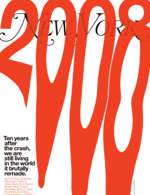 |
1. New York dedicated 27 pages in its most recent issue to a look back at the 2008 financial crisis and how it continues to shape the world we live in (“2008,” August 6–19). Alexandria Ocasio-Cortez, the socialist candidate poised to become the youngest woman elected to the U.S. House, shared the feature, writing, “The 2008 crisis represented one of the largest wealth transfers in American history … It’s time for a 21st-century New Deal.” And the Intercept’s Glenn Greenwald added, “If I had presided over all of this, or had spent the last three decades cheering the policies that caused it, I would also want everyone to spend all their time thinking obsessively about Putin and Moscow instead of who and what is responsible for this.” The inclusion of an interview with Steve Bannon incensed some readers, including Sammi Katz, who wrote, “The man is an openly anti-Semitic, misogynistic bigot who has no place sharing his twisted, despicable thoughts in your publication.” For more on the aftershocks of 2008, including extended interviews with Barney Frank, Bannon, and Yves Smith, visit nymag.com.
 |
2. More than 9/11, Frank Rich argues, the Great Recession shattered our national psyche (“America Stopped Believing in the American Dream,” August 6–19). The actor Peter Egan wrote that Rich’s article “clarified to me how the dream turned into a nightmare not only in America but throughout the world. Fantastic article.” And Randi Weingarten, president of the American Federation of Teachers, responded, “Too many Americans have not felt the recovery.” Regarding where the blame lies, Steven Fazzari, a Washington University economist, responded, “The article, correctly in my view, points out the failure of Obama administration initiatives, such as the Jeffrey Immelt–led ‘jobs council,’ to address profound insecurity many Americans feel in the aftermath of the crisis, insecurity that ‘added to the national disgust with elites’ and a loss of belief in the American Dream. This analysis raises the question of why the elite response failed. It is not primarily ‘moral abdication,’ as suggested by Rich. Rather, it was a failure of the mainstream neoliberal understanding of free-market capitalism; the elites simply did not know what to do.”
3. “In the wake of capitalism’s crisis … it was only a matter of time before the left reacted in turn by embracing its own vision of an egalitarian future,” Andrew Sullivan writes, and across the Atlantic Jeremy Corbyn is the leader of that revolution (“Jeremy Corbyn, 1970s Revanchist, Is Suddenly the Face of the New New Left,” August 6–19). Peter Dorey, professor of British politics at Cardiff University, responded, “It is testimony to how far rightwards British politics has moved in recent years that some renationalisation of privatised industries, slightly higher taxes on the rich, the restoration of free university education, and clamping down on tax avoidance should be deemed semi-Marxist and quasi-communist. In many other European countries, these policies would be classified as mainstream democratic socialism or, perhaps, social democracy.” And NYU’s David Forgacs, a scholar of British Marxism, wrote, “I was both intrigued and irritated to read Andrew Sullivan’s article about Jeremy Corbyn and Britain’s ‘new new left.’ Sullivan dismisses Corbyn’s socialism as outdated, finds his worldview ‘perverse, his collectivism anathema, and his allies sinister’ and his economic policies ‘disastrous.’ So when Sullivan appears to draw lessons for America’s Democrats, it is clear he does not really endorse these policies. What he wants, as his final sentence reveals, is for a radicalized Democratic Party to mobilize enough disgruntled voters to save liberal democracy from the far right. In other words, socialist voting for a conservative outcome.” Jeffrey J. Anderson of Georgetown University’s School of Foreign Service pointed to the trouble with drawing comparisons between the U.S. and England: “Corbyn represents a return to socialism in the United Kingdom, and Sullivan points to parallels in the United States with the rise of democratic socialists like Ocasio-Cortez. But it’s less clear to me whether a similar triumph of the new new left is possible in the United States. Take the complex problem of structure and scale. Unlike Labour, there are no commanding heights of the Democratic Party — instead, the left insurgency is playing out in a fragmented, decentralized, and regionally idiosyncratic organizational landscape. So however long the odds that Jeremy Corbyn’s brand of democratic socialism overcame, they are much, much longer here in these United States.”